There is a growing market today of consumers trying to avoid soy in their diet. Many people have developed soy allergies, and a number of people are concerned about the plant estrogen properties of soy protein. Soy protein is linked to the rise in hypothyroidism, early puberty in young girls, and lower testosterone levels in men, among other problems. Much of this research is documented in Dr. Kaayla Daniel’s book “The Whole Soy Story.”
What most people do not realize, however, is that due to the predominance of soy in animal feeds, soy protein is probably present in your food even if it is not listed as an ingredient anywhere. Very little testing has been done to determine if the soy protein from the animal feed is passed into the end products we consume. Most laboratories do not even have tests available to test for this.
Professor M. Monica Giusti, a poultry biologist of The Ohio State University, is one of the few people who has done research on soy isoflavones appearing in commercial egg yolks. She has designed lab tests to detect soy isoflavones. In 2009 one of her students published a master’s thesis on the transfer of the soy protein into egg yolks and chicken tissue: Quantification of Soy Isoflavones in Commercial Eggs and Their Transfer from Poultry Feed into Eggs and Tissues. The results of the study as stated in the abstract:
Isoflavones are potent phytoestrogens found in soybeans. Soybean meal constitutes a main ingredient of poultry feed and isoflavones may transfer into eggs and tissues. Our objective was to determine the transfer and accumulation of isoflavones from the feed into hen eggs and tissues, making them isoflavone sources in the human diet. Isoflavone content of commercial eggs with different claims were analyzed by HPLC-MS after hydrolysis. All commercial samples contained soy isoflavones and the metabolite equol. Then, 48 laying hens were fed soy-free, regular (25% soybean meal) or isoflavonerich diet. Isoflavones were found in experimental eggs and tissues. Enhancement of the diet with 500 mg isoflavones/100g feed resulted on egg yolks containing 1000μg isoflavones/100g while livers, kidneys, hearts and muscles contained 7162 μg/100g, 3355 μg/100g , 272 μg/100g and 97 μg/100g , respectively. The results showed that diet can be altered to modulate isoflavone content in hen eggs and tissues.
The author of the study has a pro-soy view of soy protein, so the study was designed to encourage more soy protein to be transferred to egg yolks and poultry tissue. The parameters of the study included comparing chickens fed a soy-free feed, and at the time Tropical Traditions’ soy-free Cocofeed was the only feed available for them to use. Since they started with laying hens that had been raised on a soy-based diet, they conducted periodic tests to determine how long it took the soy-protein to not show up in egg yolks after starting on the soy-free Cocofeed. No trace of the soy isoflavone was found after 10 days following the conversion to the soy-free Cocofeed.
So if you think you are allergic to eggs, it could be that you are actually allergic to soy protein, which is present in virtually all commercial eggs, including organic ones.
Tropical Traditions currently sells its soy-free feed from a feed mill in southwestern Wisconsin, and is currently in the process of having a feed mill on the west coast also have it available. They can be contacted here. In addition to their soy-free eggs, Tropical Traditions sells chickens and turkeys raised on their soy-free Cocofeed from their Grassfed Traditions website.



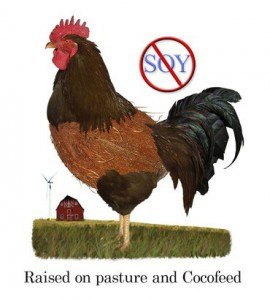
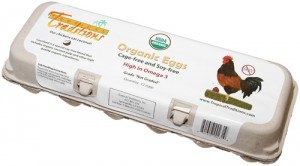
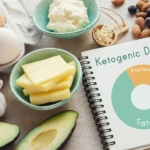 How the Simple High-Fat Low-Carb Ketogenic Diet Continues to Change People's Lives
How the Simple High-Fat Low-Carb Ketogenic Diet Continues to Change People's Lives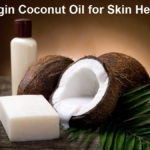 New Studies Continue to Show that Coconut Oil is the Best Oil for Treating Skin Conditions and Maintaining Healthy Skin and Teeth
New Studies Continue to Show that Coconut Oil is the Best Oil for Treating Skin Conditions and Maintaining Healthy Skin and Teeth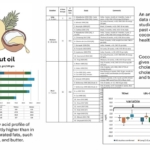 New Study Confirms Health Benefits of Coconut Oil and USDA False Claims Against It
New Study Confirms Health Benefits of Coconut Oil and USDA False Claims Against It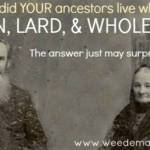 The FDA has NOT Banned Trans Fats! Traditional Saturated Fats like Coconut Oil Continue to Shine for Alzheimer's Disease but are Condemned by U.S. Dietary Advice
The FDA has NOT Banned Trans Fats! Traditional Saturated Fats like Coconut Oil Continue to Shine for Alzheimer's Disease but are Condemned by U.S. Dietary Advice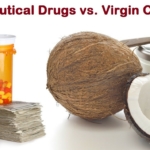 The Evidence of Coconut Oil's Superiority Over Drugs in Destroying Pathogens Continues to be Published in Peer-Reviewed Journals
The Evidence of Coconut Oil's Superiority Over Drugs in Destroying Pathogens Continues to be Published in Peer-Reviewed Journals